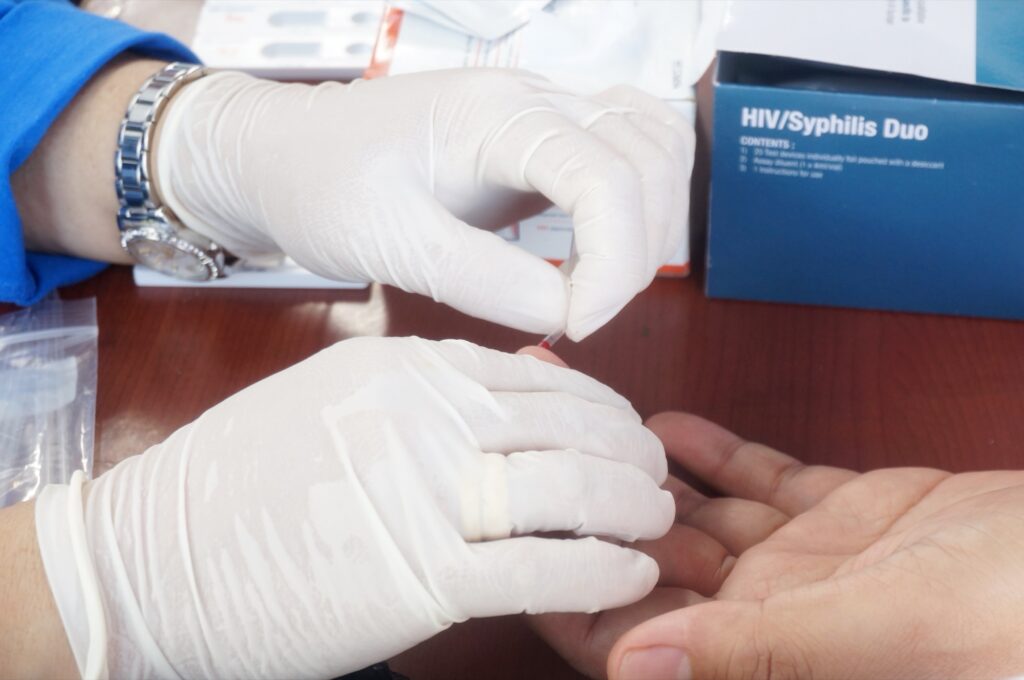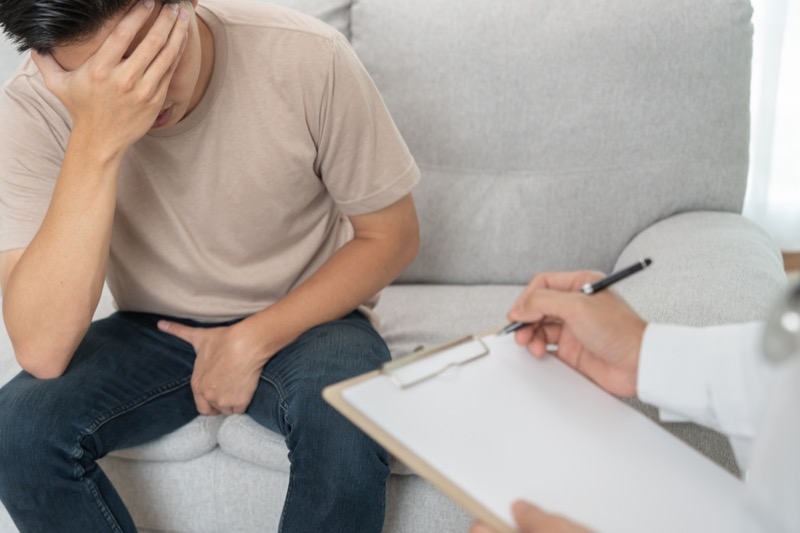Sexually transmitted diseases (STDs) are more common than many people realize, and early detection through testing is crucial to maintaining your health. Whether you’re experiencing symptoms or simply being proactive, getting tested is an important step in taking control of your sexual health. This guide will walk you through how to get STD tested, what to expect during a sexually transmitted test, and why regular STD screening is essential.
In this article, we will answer common questions like how to check for an STD, where to find STD testing, and how to tell if you have an STD. You’ll also learn how Aether Health’s SilverLake ER provides comprehensive services for STI/STD testing, ensuring a smooth and comfortable experience.
What are the different types of STD tests available?
STD tests come in various forms, each designed to detect specific infections based on how the disease presents itself in the body. Whether you’re showing symptoms or simply seeking a routine check-up, knowing the types of tests available can help you understand what to expect.
Blood test
Blood tests are used to detect infections that affect your bloodstream. They are commonly used to screen for HIV, syphilis, and herpes. A small sample of blood is drawn from your arm and analyzed for the presence of antibodies or antigens that indicate infection. Blood tests are effective in diagnosing diseases that may not present visible symptoms but can still affect your health long-term.
Urine test
A urine test is often used to detect gonorrhea and chlamydia—two of the most common bacterial STDs. During this test, you’ll provide a urine sample, which is then tested for the presence of bacteria. Urine-based tests are non-invasive and provide quick results, making them a popular option for routine screenings.
Swab test
For certain STDs, like HPV, gonorrhea, or chlamydia, a healthcare provider may take a swab from the affected area, such as the genital region, throat, or rectum. Swab tests are useful for identifying infections in specific locations of the body, particularly for people experiencing symptoms like sores, lesions, or abnormal discharge. The sample is analyzed in a lab to check for the presence of viruses or bacteria.
Physical exam
In cases where visible symptoms are present, such as genital sores, rashes, or unusual discharge, a doctor may perform a physical exam. This type of exam allows the healthcare provider to visually inspect the affected area for signs of infection. Physical exams are often combined with other tests, like swabs or blood tests, to confirm the diagnosis.
Each sexually transmitted test is tailored to detect specific infections. If you’re unsure about what type of test you need, a healthcare provider can guide you based on your symptoms or risk factors.
How do you prepare for an STD test?

Preparing for an STD test is simple, but taking a few extra steps can ensure accurate results and a smooth experience.
Whether this is your first time getting STD testing or you’re returning for a follow-up STD check, here’s how you can properly prepare for an STD test:
1. Be open and honest
Before your STD screening, it’s essential to be transparent with your healthcare provider. Share your complete sexual history, including any symptoms you’ve noticed, past STDs, and information about your sexual partners. This allows your provider to recommend the appropriate sexually transmitted tests and ensure that nothing is missed. Don’t be afraid to ask questions about the tests—they are there to help.
2. Avoid urinating before your test
If your STD check involves a urine sample, try to avoid urinating for at least one hour before the test. This ensures that the sample collected will contain enough bacteria or viral traces for an accurate diagnosis. A diluted urine sample may affect the test results, especially for infections like chlamydia or gonorrhea.
3. Abstain from sexual activity
Refrain from any sexual activity—whether oral, vaginal, or anal—before your appointment. Having sexual contact right before your test could introduce bacteria or viruses that may interfere with your results. It’s best to wait until after you’ve completed your sexual disease test and received your results before engaging in any sexual activity.
Where can you get STD testing done?
If you’re wondering where to get tested for STDs, Aether Health is a top option. Their 24/7 emergency rooms in Texas offer confidential and convenient STD screenings. Their healthcare professionals are experienced in performing STD tests, ensuring accurate results in a compassionate setting.
What should you expect during an STD test?
STD tests are designed to be quick and straightforward, ensuring that you feel as comfortable as possible throughout the process.
While the specifics of your test will vary depending on the type of infection being screened, you can generally expect the following:
Minimal discomfort
Whether it’s a blood draw, urine sample, or swab test, the procedures are usually brief and cause little to no pain. Healthcare providers take steps to make the process as smooth and painless as possible.
Privacy and confidentiality
STD testing is done with the utmost respect for your privacy. Your healthcare provider will explain the steps of the test and answer any questions you may have, ensuring you feel comfortable and informed throughout the process.
Quick and efficient testing
STD screenings are generally fast. Most tests take only a few minutes to complete, whether you’re providing a urine sample or undergoing a physical exam. You won’t need to spend much time in the clinic.
Open communication with your provider
Expect a supportive and judgment-free environment. Healthcare providers are there to help and will offer clear explanations of what each test involves and what your results might mean.
How are STD test results delivered?

STD test results are typically delivered in a few days, depending on the type of test. Many healthcare providers will offer secure online portals where you can view your results. Others may call you directly or ask you to schedule a follow-up appointment. Aether Health’s SilverLake ER ensures that you receive timely and confidential results.
How often should you get tested for STDs?
How often you should get an STD check depends on your sexual activity and risk factors. Generally, it’s recommended that sexually active individuals get tested at least once a year. However, if you have multiple partners or engage in unprotected sex, more frequent testing may be necessary.
What do you do if your STD test results are positive?
If your results come back positive, don’t panic. Most STDs are treatable, and your healthcare provider will guide you through the next steps, including treatment options and notifying any partners. Early detection through regular STD screening makes treatment more effective, and your healthcare provider at Aether Health can provide the necessary care.
Are there at-home STD testing options?

Yes, there are several at-home testing kits available that allow you to collect samples and mail them to a lab. While these are convenient, it’s essential to follow the instructions closely to avoid inaccurate results.
Additionally, some infections may still require in-person testing for proper diagnosis. Aether Health offers comprehensive in-office STD screenings if you’re looking for professional guidance.
Why is regular STD testing important for your health?
Regular STD testing plays a vital role in preventing the spread of infections and maintaining your health. Early detection can lead to quicker treatment and a better outcome. Many STDs can be asymptomatic, so even if you feel healthy, regular testing ensures you’re staying proactive about your sexual health.
Additional Frequently Asked Questions
STD testing often raises common questions about when to get tested, how to do it, and how to discuss it with partners. Below are answers to frequently asked questions that can help guide your decisions and ease any concerns.
When do I need STI screenings?
You should consider getting STI screenings if you’re sexually active, especially with new or multiple partners, or if you notice any symptoms like unusual discharge, pain during intercourse, or sores.
Can I do an at-home STD test?
Yes, at-home tests are available, but in-person tests at places like Aether Health offer more comprehensive and accurate results.
Where can I find STD testing near me?
For residents in Pearland, TX, Aether Health’s SilverLake ER offers 24/7 STD testing services in a discreet and comfortable environment.
How can I start a conversation with my partner about STI testing?
Be open, honest, and non-judgmental when discussing STI testing with your partner. Emphasize that getting tested is about ensuring both your health and well-being.
The Importance of Regular STD Testing
Getting tested for STDs is an essential step in safeguarding your overall health. You can protect yourself and your partners by understanding the types of tests available, knowing what to expect, and staying proactive with routine screenings. Remember, early detection leads to better treatment outcomes, so don’t hesitate to get tested and stay informed.
Whether you’re checking for an STD after noticing symptoms or being proactive with routine screening, Aether Health’s SilverLake ER is a trusted resource for STD testing. With their 24/7 emergency room in Pearland, you can get tested anytime, ensuring peace of mind and professional care. Visit them today!



